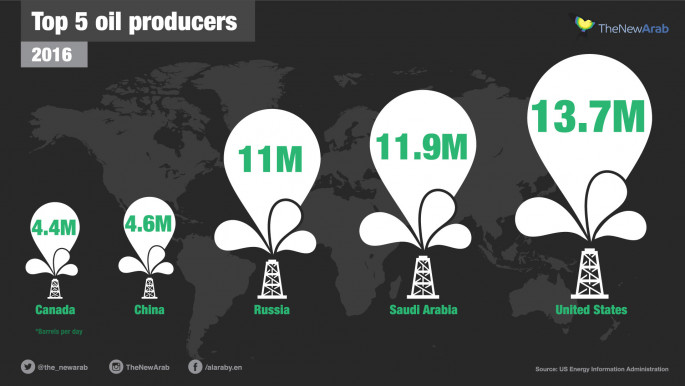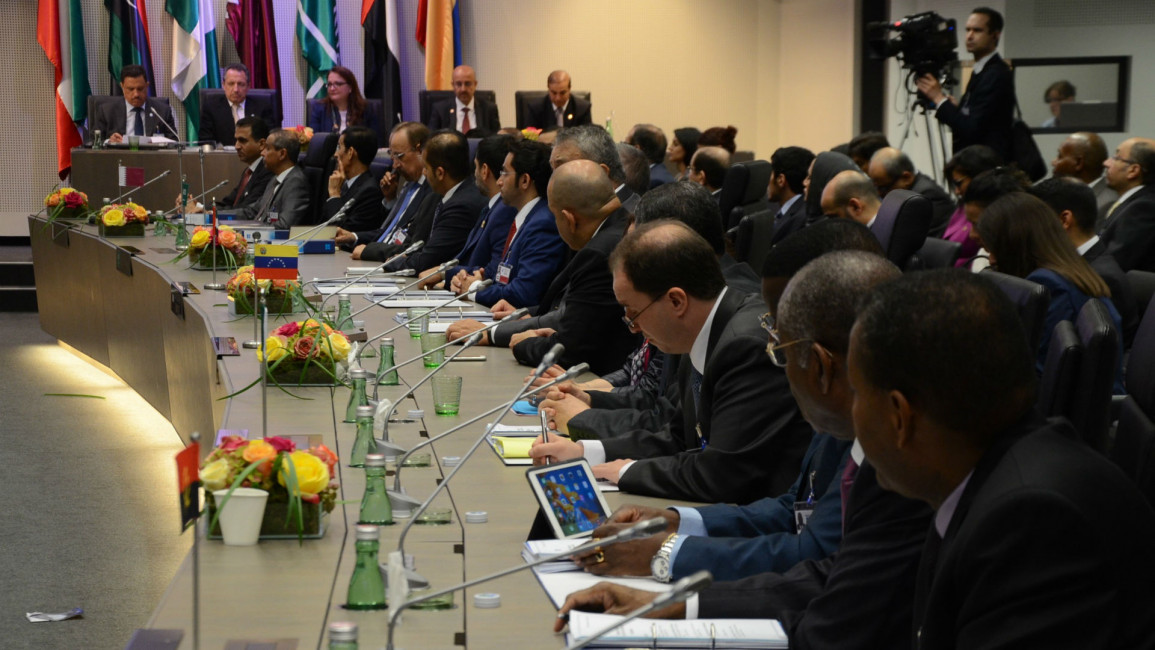Saudi Arabia and Iran oil talks end in deadlock
Saudi Arabia and Iran oil talks end in deadlock
Officials from two of the world's most oil-rich nations - Saudi Arabia and Iran - have failed to hammer out an agreement on output, ahead of crunch OPEC talks.
2 min read
The regional rivals are refusing to budge on oil production [Getty]
Negotiations between oil giants Saudi Arabia and Iran to ease a global oversupply of crude and boost oil prices have ended in deadlock.
The world's major oil producers are meeting in Algiers to find a solution to the glut.
But hopes that by oil producers that prices will recover have been dashed as Iran rejected a proposal from Saudi Arabia to limit its oil output in exchange for Riyadh cutting supplies.
"The gap (in views) between OPEC countries is narrowing. I don't expect that an agreement will come out of the consultations tomorrow," Saudi Energy Minister Khalid al-Falih, referring to informal talks in the Algerian capital on Wednesday.
Iraq is mediating talks between the regional rivals, whose refusal to reach a deal has been complicated by the wars in Syria and Yemen, with each fighting for an opposing side.
Iran wants its pre-sanctions share of the crude oil market, while Saudi Arabia has said it would not cut production without similar pledges from all OPEC members.
"Iraq is leading a mediation to bring the viewpoints of Saudi Arabia and Iran closer, in order to get out of the crisis and support oil prices," said Iraqi oil ministry spokesman Asim Jihad.
"There are still some obstacles preventing an agreement," he said, giving no further details.
Iranian Oil Minister Bijan Zanganeh said a deal could be brokered at the next formal OPEC meeting in Vienna on 30 November.
Oil prices have more than halved since 2014 due to oversupply, with the dip in petrodollars putting a strain on government budgets - particularly in the oil-dependent Gulf states.
Saudi Arabia has been hit hard, this week announcing a 20 percent cut to ministers' salaries amid a raft of money-saving measures.
The world's major oil producers are meeting in Algiers to find a solution to the glut.
But hopes that by oil producers that prices will recover have been dashed as Iran rejected a proposal from Saudi Arabia to limit its oil output in exchange for Riyadh cutting supplies.
"The gap (in views) between OPEC countries is narrowing. I don't expect that an agreement will come out of the consultations tomorrow," Saudi Energy Minister Khalid al-Falih, referring to informal talks in the Algerian capital on Wednesday.
Iraq is mediating talks between the regional rivals, whose refusal to reach a deal has been complicated by the wars in Syria and Yemen, with each fighting for an opposing side.
Iran wants its pre-sanctions share of the crude oil market, while Saudi Arabia has said it would not cut production without similar pledges from all OPEC members.
"Iraq is leading a mediation to bring the viewpoints of Saudi Arabia and Iran closer, in order to get out of the crisis and support oil prices," said Iraqi oil ministry spokesman Asim Jihad.
"There are still some obstacles preventing an agreement," he said, giving no further details.
Iranian Oil Minister Bijan Zanganeh said a deal could be brokered at the next formal OPEC meeting in Vienna on 30 November.
Oil prices have more than halved since 2014 due to oversupply, with the dip in petrodollars putting a strain on government budgets - particularly in the oil-dependent Gulf states.
| Read more: Can Arab oil giants move beyond petroleum? |
Saudi Arabia has been hit hard, this week announcing a 20 percent cut to ministers' salaries amid a raft of money-saving measures.
In April, the king's son, Deputy Crown Prince Mohammed bin Salman, announced the wide-ranging Vision 2030 plan to diversify the economy. Officials claim the plan will alco create a more efficient and accountable administration, although critics have been sceptical that it will reconfigure the economy successfully.



